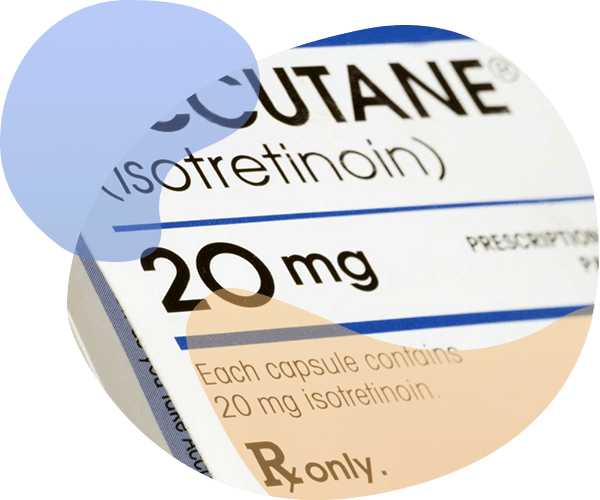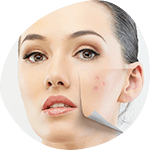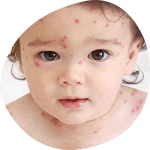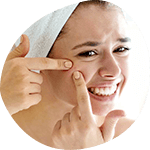Isotretinoin: The Key Drug to Treat Acne
Accutane, the trade name for Isotretinoin, is one of the most effective drugs for treating acne, although it has recently been the subject of conversation as it has been linked to some complicated organic disorders, including mental problems related to suicidal tendencies.
These claims are quite dangerous, but not well substantiated. Some specialists confirm that side effects can haunt us throughout life, but not such complicated problems as suicide, but some dryness in the mucous membranes.
Yet, as we have mentioned, all this has been left in words, and there is no study that really confirms the power of Accutane to cause these disorders. In fact, it is normal to expect some side effects since pharmacists created Isotretinoin to treat cancer in the first place, a much more complicated pathology that requires more effort.
Acne is one of the most delicate diseases, which can directly attack our mood and the way in which we develop constantly in our lives, since it greatly affects self-esteem.
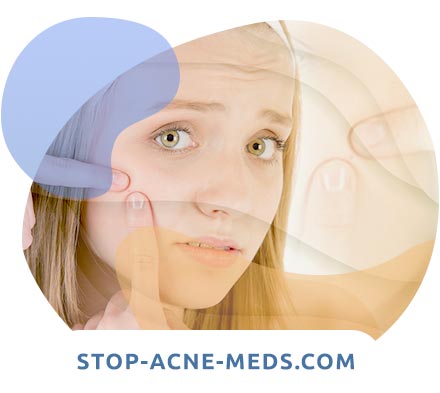
The self-perception that we have is one of the most important requirements to develop properly in any field, be it work or social. Therefore, acne is a really incapacitating disease, which cannot be hidden very easily.
It is necessary to emphasize that people who suffer from acne can have the pathology in different phases. Comprar accutane online is special for most of them, but we recommend that you see your doctor for more information. Some mild forms, such as inflammatory acne, give way incredibly with the use of Isotretinoin, but some others (such as fulminans) require antibiotics and other adjunctive therapies.
For this reason, we remember that the only one qualified to indicate Accutane is the dermatologist, since it is a quite delicate drug that has its specific moment of use. We cannot abuse it, let alone try to use it on our own. Let's learn a little more about Accutane and why it is so effective in treating skin problems.
The Retinoids behind Accutane
The main effect of this drug is mediated by the sebaceous glands, which are the first to be involved in the pathogenesis and development of acne, as well as other mechanisms that we will mention below.
It is important to point out that the physiopathology and origin of acne respond to several variants, which seem to cover Accutane perfectly.
1. Clear reduction in tallow production:
Tallow, as mentioned above, is part of the origin of acne. This oily substance is the lubricant used by the skin of any mammal in order to continue to exist. If we only used water on our skin, the result would be that it would evaporate at some point and dry out too much. For this reason, oils are fundamental to our body.
However, if they are being produced in excess, and we can't control that kind of production, that's when acne-related flashes begin to appear. In this disease, sebum is the fundamental origin of the pathology, since it closes the pores and ends up causing a kind of plug that later becomes infected.
By decreasing sebum production, which is the main effect of Accutane on our skin, the best effect we will have is that it will greatly improve acne. The less sebum, the less accumulation, which will decrease the neoformed acne. It should be noted that this effect takes a few weeks with Accutane, but it is quite effective.
2. Antimicrobial
Bacteria are also part of the pathogenesis of this disease. The real, initial problem is that these microorganisms are part of the skin's natural flora, but sebum changes things. Having a perfect plug, the bacteria begin to multiply uncontrollably and colonize the area very easily.
Although Isotretinoin is not a bactericide or antibiotic, its indirect effects on these microorganisms are equally effective. By decreasing fats and oils, Accutane creates a hostile environment for bacteria in which they cannot survive, so they die quickly. This is another important effect of this drug.
3. Inflammation and Replacement
Another effect, which is also little known, is that Isotretinoin can decrease the inflammation that exists in our skin during the height of acne, and decrease cell turnover. This last characteristic is important in the case of other more dangerous pathologies, such as cancer, where cell replication is one of the key points in stopping the progression of the disease.
Isotretinoin and its Uses
Today, the most important purpose of Isotretinoin is to treat moderate to severe acne, perhaps not so much the milder phases, especially in those patients who are quite complicated but have not reached the final stages as acne fulminans.
Any of the more aggressive versions of acne, without reaching the latter mentioned, could be a perfect target for Accutane. In fact, all the positive experience with the use of this drug has assigned it an incredible place as "the cure for acne," according to several specialists.
The only way that Accutane is not effective is because of problems related to the patient himself, who is not able to follow the treatment to the letter as recommended by his specialist. Minor things
People who suffer from acne may have some long-term complications, where the scars and all the permanent lesions resulting from this disease are the ones that most affect the patient. The dangerous thing is that they do not mark us so much physically, but psychologically, since we will never be able to erase them from our skin.
Still, what many do not know is that Isotretinoin is not only a drug used for the treatment of acne, or similar skin lesions, but may also be useful for cancer. In fact, today is part of some lines of treatment in such diseases.
Cancer: Accutane's Preferred Objective
Although Accutane has emerged almost from the beginning as a drug used for acne, since before the 1980s it has been thought to be a powerful anticarcinogen thanks to its properties on cell turnover. In fact, retinoids are widely used for certain types of neoplasms, so it was not uncommon to think about it.
Other vitamin A derivatives also have the same effect, they can regulate cell growth and differentiation as well as programmed death. These three factors are key in the development of any tumor disease, especially in its progression or metastasis, since it is there that they become totally lethal.
Through the stimulation of certain specific receptors, retinoids can control all these processes. Most of them are in the center of the cells, in their nucleus. Although we put it quite simply in words, the truth is that it involves many inflammatory mediators and so on to be able to put all these routes in motion.
Controlling reproduction and the way cells differentiate is fundamental to being able to talk about an anticarcinogen. According to the available studies, it seems that Isotretinoin has become fundamental in the treatment of some types of lymphoma, breast tumors, lung, and even head and neck.
Of course, most of this research is still under the scrutiny of science, we still don't know for sure several of the mechanisms and we want to know if it might work for other types of tumor disorders. Undoubtedly, Isotretinoin and its properties make it excellent for combating this very dangerous disease, but we must learn to use it well.
Side Effects
The biggest problem with Accutane, the so-called acne cure, is that it has many adverse effects. This is the part that the specialists don't like to mention, since -of course- they live off the potential of this drug. Even so, we want to tell you something: the benefits outweigh the adverse effects.
The important thing is, Isotretinoin has come a long way to pharmacies. It has had to pass an incredible number of examinations and tests to corroborate whether it was harmful to our body, and it has all passed. The biosafety margin is incredibly high, yet only a doctor can prescribe it.
Even so, like any existing drug, Accutane has several adverse effects that need to be talked about:
Cutaneous
As we mentioned, the sebum in the skin plays a fundamental role. If we didn't have it, our skin would live dry, crack quite often and we would be exposed to possible bacterial infections for the most part. Since Accutane blocks sebum production, the lack of lubrication will end up affecting us a little.
This is one of the most frequent symptoms, especially in the mucocutaneous region. One of the most renowned things is that "lips will dry out" with the use of Accutane. However, the inside of our cheeks and even other regions can also dry out significantly.
Even so, all these adverse effects can be overlapped if we know how things work properly. For example, doctors, when prescribing Accutane, also indicate that the patient use another type of lip balm or lip balm to prevent dryness.
It is also necessary that you use body lotions that keep your skin hydrated. As mentioned, we want to avoid possible lesions or bacterial infections that might appear.
Other studies report that it may also affect both the nasal and ocular mucosa, drying it out a little, so it is necessary that you do not wear contact lenses at least while you are using the medicine.
Pregnancy Care
An important complication of Accutane is that it can permanently affect the babies of pregnant women, since it is a potent teratogenic: it can cause severe malformations in babies before birth, even may not arrive alive at birth.
Those at greatest risk are those babies who are during the first trimester, when they are much more susceptible to delicate changes in their structure, especially the neural part that is developing during that time.
All women must undergo several tests or diagnostic tests before using Isotretinoin, even before they even go to the doctor. One of the most important is the pregnancy test, because it is necessary to determine if you have a baby on board before starting such a dangerous medication.
In fact, during all the months of use (when the concentrations of Isotretinoin are higher in your blood), it is necessary for you to use effective contraceptive methods to reduce the risk of becoming pregnant.
Even so, most of the time the risk with Isotretinoin is only during the first two months, because from then on if you can use the medication without thinking about being pregnant or not. Even so, of course, the specialists' recommendations are that you should not have sexual intercourse for reproductive purposes during that time.
In the case of men, and possible alterations in the semen, the specialists have concluded that there is no obvious or latent risk that could lead to some type of malformation in babies. Therefore, it is quite safe in the male sex.
A Delicate Intestine
Unfortunately, the most common symptom (as an adverse effect) of drugs is related to the gastrointestinal system. Not only are there problems related to the transit of food (diarrhea or constipation), but even some people have manifested the presence of blood in their stool with the use of this drug.
In general, it is quite likely that you will suffer from diarrhea or constipation, especially when you are starting to take Isotretinoin, since it is there that we are more sensitive. Our body still does not adapt to a foreign substance that is entering the body. However, the ideal is that you learn to maintain measures that can counteract these symptoms
For example, you can drink a lot of water and eat some fiber, in the case of constipation, or start using some medications if you have a lot of diarrhea. After all, you will only be using this drug for a couple of months. It's worth the effort.
On the other hand, you may also see some blood in your stool, but this is an adverse effect or an important symptom that is only seen when there is too much constipation. Sometimes, bowls become too solid and end up injuring the rectum and anus with their transit. So the treatment remains the same: find a way to make the stool softer.
Other Adverse Effects
Although there are several, since all people are different and may react differently to the presence of this medicine in their body, it is necessary to mention that the most frequent are disorders related to exposure to sunlight.
With the use of Isotretinoin, the risk of burns increases incredibly. It seems that we become more sensitive to ultraviolet exposure with the use of this drug, which is why dermatologists use sunscreens (or at least indicate it) in all patients who use Accutane.
Although many specialists do not want to use Accutane because of its adverse effects, the truth is that most of the things they claim are not supported by science. Available studies, despite the adverse effects mentioned above, recommend Isotretinoin for its large biosafety margins.
If there were any real risk that compromised the patient's life, there would surely already be enough information about it, with all the attention that has been given to this drug. The real danger is having acne forever, and that's just what we're going to avoid.
| Table 1. Acne Severity Determination | ||||
| Severity | Comedones (amount) | Papules / pustules (quantity) | Nodes (quantity) | Complications (dyschromia / scars) |
| Easy | Malocalized (less than 10) | Malocalized (less than 10) | No | +/- |
| Average | Lots (10 to 50) | Lots (10 to 30) | Few (less than 5) | ++/- |
| Heavy | Many, extensive defeat (over 50) | Many, extensive defeat (over 30) | Lots (over 5) | +++/++ |
| Table 2. Assessment of the severity of the skin process in patients with acne | |||||||
| Elements of rashes | 0 points | 1 point | 2 points | 3 points | 4 points | 5 points | 6 points |
| Comedones (number) | Are absent | 10 | 20 | 30 | 40 | 50 | Over 50 |
| Papules / pustules (number) | Are absent | 10 | 20 | 30 | Over 30 | - | - |
| Nodes (number) | Are absent | Less than 5 | More than 5 | - | - | - | - |
| Dyschromia | Are absent | + | ++ | +++ | - | - | - |
| Scarring | Are absent | + | ++ | +++ | - | - | - |
| The total severity of acne (OTU) = the sum of the points of all the elements of the rash | |||||||
Recommendations for using Accutane
There are several important points that we must mention, which every patient should know or consider before starting this treatment:
1. Attentive and Honest
Before you even begin treatment, you need to be completely honest with the information you give your doctor in the consultations prior to the start of treatment. Any detail, no matter how small, can be fundamental for your doctor.
You must mention every pill or medication you are taking, as well as any possible illness you are suffering from. For example, if you are taking several pills to control a base disease, they may affect your liver and things may get complicated when you start taking Accutane (which is metabolized in the liver).
You should even mention the foods, tea, herbs, and other natural medicines you are taking for at least the last three months. All the information you can provide is vital to avoid the various complications that come with consuming Accutane.
2. No vitamins
If you were taking supplement or multivitamin before you started Accutane, then it's time for you to cancel and abandon it. Remember that this drug is a direct derivative of vitamin A, the retinol par excellence. So you should avoid consuming both.
The abnormal increase of vitamin A in the body can have significant adverse effects, including putting your life at risk depending on the amount and concentration you consume. It is best to use some other supplement such as B complex or another.
3. No Babies
As we mentioned from the beginning, Isotretinoin is quite teratogenic, so it's best to keep it away if you really want to have children. We recommend, of course, that you get all the relevant tests before you start treatment, especially if you are of childbearing age and have an active sex life.
In fact, another detail we haven't mentioned is that you shouldn't feed your baby (if you already have one) while using this medication. Accutane can break through barriers to breast milk, so your child will also suffer from the effect of this drug if breast-feeding.
4. Be responsible
An important and fundamental indication is that you have a clear objective throughout the course of the therapy, so that you can concentrate on using the necessary doses and intervals, apply your sunscreen, stay out of the sun, and so on. That you comply with all the measures that your doctor is giving you so that you can go through the whole therapeutic period in the best possible way.
In fact, we are trying to improve your health, so it is necessary that you also do your part. The only people who don't get better with Accutane are those who don't follow the relevant indications to the letter, or who have a lack of attachment to the treatment.
I think throughout the article it has become quite clear about the power of Isotretinoin to cover and eliminate a problem as annoying as acne, so if we are going to give it a chance to improve our skin, we must commit ourselves to it.
Monitoring: The Strategy for Success
Although the important thing is to properly start treatment with isotretinoin, considering each of the possible limitations and adverse effects as well as their solutions, it is necessary that we have a strict control with our dermatologist, because only this specialist is who should supervise us.
As we mentioned, the greatest risk of this drug is that doses or intervals are not used correctly, so it is necessary that we take care of ourselves and always go to the specialist. In addition, isotretinoin may react differently depending on who is taking it. As we all know, we all have a different sensitivity to medicines.
I certainly think it is clear to us that this is an important drug for the treatment of acne and that it has a good margin of biosecurity, but even so we should not neglect ourselves.
Articles
Acne: A Global Health Problem
Acne is one of the most important pathologies of this century. Not because of the effect it really has on our health, but because society has been evolving towards a time when physical appearance is one of the most relevant factors in everyday life. This disease not only affects our skin, but also our self-esteem.
Acne is a chronic inflammatory disease of the skin, where the pilosebaceous unit (the glands responsible for oil secretion and hair) are affected. Not only can it involve the face, which is often believed, but it can be almost anywhere this unit exists.
It is a disorder that has a higher incidence during adolescence, although it can affect children as well. It can manifest itself in several different ways, not only as common acne (with comedones), but it can also be papulopustular, with nodules or cysts.
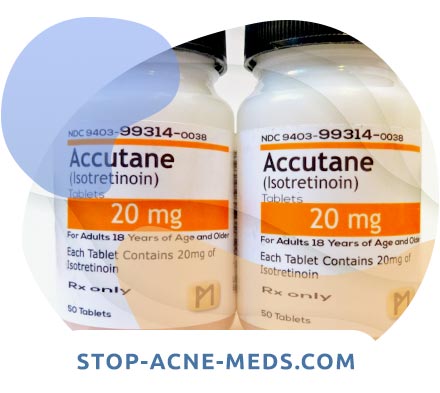
Of course, there are other more serious versions of acne that involve more damage to the skin, especially the scars that appear after the famous comedones disappear. It may even end up in a septic disease, where bacteria travel through the body always.
On the other hand, as a relevant fact, acne can also be the symptom of some other underlying disease. Most people always tend to see it with a disease itself, but the truth of the matter is that sometimes it can be nothing but the expression of some other, such as polycystic ovary syndrome.
Any disorder that can increase male hormones, androgens, will have an important effect on the onset of this disease. Remember that women also have androgens in their bodies, but not as much as men, which is why acne is more common in men. But, let's take a closer look at its causes and the various triggers.
The Truth Behind Acne
The causes of acne are multiple. Certainly, there is not only one factor that is only associated with this disease, but there are several that interact with each other to give rise to this disorder. The fundamental lesions of acne, comedones, are the result of a complex synergy between basal hormonal disorders and bacteria with the pilosebaceous units.
Of course, it is also necessary that there is an important genetic component capable of biologically altering the morphological structure of the whole unit in order to facilitate the appearance of acne. This is the reason why in some families we observe a long list of people affected by this disease.
However, androgens are responsible for stimulating the sebaceous glands to increase the production of its only agent, sebum, a fatty and lipidic substance that covers almost all sectors of our skin. This is the beginning of the development of the disease.
Subsequently, the increase in production causes an inflammatory response within the pilosebaceous unit, which is what produces a kind of coating on the follicle that ends up acting as a plug. Then, what happens is that the site through which the sebum was supposed to keep coming out and flowing is closed. This is the beginning of the pathology indeed.
Propionibacterium acnes is the first bacterium really isolated and that has been confirmed as one of the most important causes of this disorder. what is happening? The tallow plug is a perfect base for the growth of this bacterium, which is anaerobic, which means that a medium without oxygen is the ideal place to proliferate and establish a colony.
The inflammatory reaction caused by the same factors released by this bacterium also contributes to an entire complex that only creates the famous comedones, both open and closed. This chronic inflammation, together with the rupture of the comedones, is what gives rise to the scars that end up marking us for life.
Cataloging the Causes of Acne
We are going to list the most important factors related to the origin and triggering of the disease, but the truth of the case is that there are many. Among the most relevant we have:
- Age: It is one of the factors most related to acne. The most common is that the age of the patient ranges between 10 and 17 years if they are female, and up to 19 if they are male. However, it is necessary to emphasize that it can appear at any time depending on the conditions of the people who suffer it.
- Sex: without a doubt, since males have more androgens circulating in their blood and during puberty these levels increase even more, the male sex is the most affected.
- Race: For some reason still being studied, both Asians and blacks have a lower incidence of this disease, which means they must have some protective factor since androgen concentrations remain the same regardless of the type of population being studied.
- Occupation: there are certain agents that can facilitate the presentation of the disease and are even considered acneigenic. These are capable of favoring the appearance of inflammatory reactions, promoting the blockage that gives rise to acne.
- Endocrine Factors: although we have been talking a lot about androgen hormones, more related to man, the truth is that there are several endocrine-dependent factors capable of giving rise to the disease. One of the most important is stress, which is a factor widely studied and known as aggravating.
Types of Acne
There are several and it can be difficult sometimes to distinguish one from the other. To begin with, we recommend that you have a dermatology specialist evaluate your condition and arrive at an effective diagnosis of what your pathology is. However, with a purely informative and educational character, we tell you which are the most important types of acne:
1. Comedonian
This is the mildest version of acne. In this degree, it is not even catalogued as an inflammatory acne, but simply speaks of the presence or absence of comedones, which can be either open (showing a whitish background) or closed (with a black background).
Undoubtedly, this is the earliest phase of acne that is easier to treat, unlike the other stages where lesions can already become permanent and there is no easy way to get rid of this disease.
2. Papulo-pustular acne
This is the first degree of inflammatory acne, where we begin to catalog it as a serious version that begins to paint complicated for treatment. Here the options are drastically limited since there is an abysmal difference between the comedonian and this.
The most important thing is that the pustules, which are vesicles with purulent content, begin to accumulate on the face on a larger and bulkier erythematous base that does not allow the lesions to be emptied normally, and that is the reason for the scar that remains after the pathological process.
3. Pustulo-nodular
This is where the situation is starting to get complicated. They are no longer simple papules (elevations of less than one centimeter in diameter) but begin to group together to form complex nodules that are loaded with purulent material and with a terribly inflamed skin around them.
In this case, it is impossible to get rid of this disease without leaving lesions. Not only do you have a conglomerate of pus on your face, but there is also edema and erythema which are the main causes of scarring. In addition, it can easily affect the torso and back.
4. Cystic Nodule
This is the last version, before reaching acne sepsis (where bacteria enter the bloodstream and spread throughout the body, creating a serious condition). This type of acne normally affects almost the entire upper part of the body and leaves a scar, both on the face and in the rest of the affected regions.
Diagnosis of Acne
As we mentioned at the beginning of the previous section, only a dermatology specialist should evaluate something as delicate as your face, and properly tell you that what you suffer from is acne and not some other type of disease with which it can be easily confused like rosacea.
Now, the key evaluation of your dermatologist will be the physical examination, without any other important study, in order to arrive at an accurate diagnosis of the pathology. Without a doubt, the experience of the specialist is what is going to dazzle in this case, so we recommend that you look for a person with enough experience to be able to treat you properly.
To be sure, the specialist will be based on the type of injuries and each of the characteristics they have. For example, the shape, the number of lesions, the area of affection, whether there are scars, whether or not it is inflammatory, etc.
This will depend on whether you have an adequate treatment that can cover each of your needs. Remember, it is not only about eliminating the disease, but doing it properly. Once your face is marked there is no turning back, so we must do everything with care.
Acne Treatment
Let's start with something key: this is one of the most studied diseases in the 21st century, so its treatment may involve many measures that continue to be constantly updated each year to improve the way in which these patients are approached.
There are both pharmacological measures (those involving the use of any medicine) and non-pharmacological or general measures. It is also important to emphasize that, in some cases, a small surgical intervention may be necessary to help with the drainage of the cysts or nodules that form as a result of the advanced stages of this disease.
Non-Pharmacological Measures
These depend greatly on the person and the type of acne they have. We can recommend some basic things like washing your face every day, with pH soaps and special conditions that do not cause further injury, but help us control the disease.
Another important measure, which comes under the new recommendations and recently published studies, is that we control the way we eat. While it was once believed that food had nothing to do with the onset of the disease, we now know that this is not the case.
Some diets where essential elements are lost, such as zinc and omega-3, may be key to the origin of the disease. Let us remember that zinc (speaking of this case) is an essential mineral capable of acting as a bacteriostatic, so it would not allow Propionibacterium acnes freedom to proliferate and continue its effect.
In addition, it is also important to control those factors that initially contributed to the disease. If it is a woman with polycystic ovary, the important thing is to control the disease beyond trying to control acne. On the other hand, if you are burdened with too much stress, then we should go to therapy and start making better decisions.
Pharmacological Measures
In short, there are many treatments that are currently used ranging from pills to some ointments with drugs and special compounds to limit the progression of the disease.
What is most used today is oral Isotretinoin, a retinoid that works effectively against acne. While there are other topical retinoids that can be used in milder versions of the disease, even in conjunction with antibiotics or other compounds such as benzoyl peroxide, Isotretinoin is best.
This drug was initially developed as an anticarcinogenic agent, but scientists realized that this drug could limit and decrease with tremendous effectiveness the progression of acne. Although the mechanism of action is still unknown, specialists propose several things.
Firstly, it seems to act as a special antimicrobial against Propionibacterium acnes, in addition to decreasing sebum production, which would avoid all this problem from the beginning. Even so, this drug has several side effects that we should be aware of. For this, and other reasons, it is necessary that you are in frequent control with your dermatologist.
By: Dr. Erin Gilbert
 DE
DE FR
FR IT
IT ES
ES